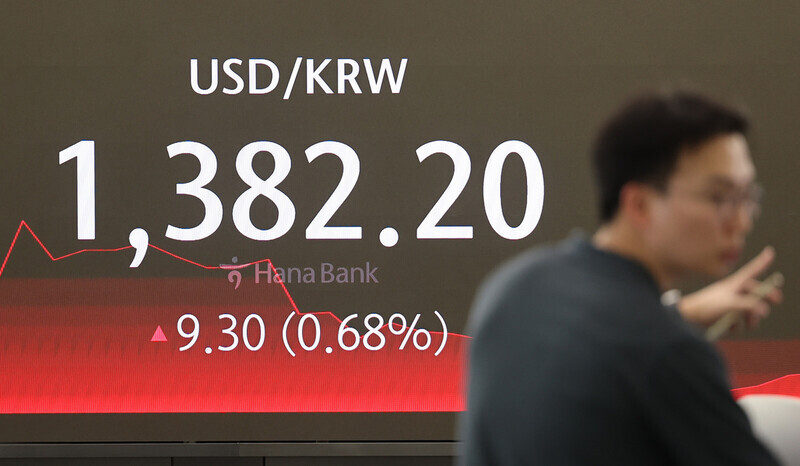hankyoreh
Links to other country sites 다른 나라 사이트 링크
Value of Korean won down 7.3% in 2024, a steeper plunge than during 2008 crisis

The exchange rate between the Korean won and the US dollar has risen 7.3% this year alone, exceeding the rate of increase seen during the 2007-2008 financial crisis. While the US dollar is strong in markets across the globe, the disparity between the dollar and the won is still greater than the disparity seen in other currencies. Some analysts say that the internal and external weaknesses of the Korean economy are reflected in this disparity.
On Friday, the dollar-won exchange rate closed the day at 1,382.2 won on the Seoul foreign exchange market. This is an increase of 7.3% from the exchange rate recorded at the close of 2023 (1,288 won).
An increase exceeding 7% within just three months of the new year is nearly unprecedented in the history of the Korean won. This is the largest rate of increase seen since the introduction of the “market average” exchange rate system in March 1990 (revised to the “flexible” exchange rate system in December 1997).
Even in 2008 and 2009, during the global economic crisis, the greatest rates of increase within a three-month period were 6.9% and 5.8%, respectively. During the 1997 Asian financial crisis, the won rose 6% to the dollar between January and April. During the crisis, the exchange rate rose from around 1,000 won to nearly 2,000 won by the end of the year. The current rate of increase is therefore the most severe increase we’ve seen since 1997.
It is true that the recent exchange rate has been impacted by the general strength of the dollar, which is prevalent in markets worldwide. As of Friday, the US dollar index (value of dollar compared to value of six other major currencies) has risen 4.8% since the end of last year. Yet even with this in mind, the Korean won has still depreciated around an extra 2.5%.
According to the Fed’s calculations of the US dollar index, the Korean won is showing the seventh-highest rate of depreciation among the 26 currencies that are used to calculate the index. In the same period, the currencies that fell in value at a greater pace than the Korean won were the Chilean peso (10% drop), the Japanese yen (9.8%), the Swedish krona (9%), the Swiss franc (8.5%), the Brazilian real (8.1%), and the Argentinian peso (7.6%).
Conversely, the euro (3.7%), the British pound (2.3%), and the Australian dollar (5.8%) all rose in value compared to the dollar. The continuing depreciation of the Japanese yen has resulted in the yen dropping in value by around 10%. Considering that Japan is one of South Korea’s competitors in the global market for exports, the declining value of the Korean won is unlikely to boost the price competitiveness of Korean goods.
South Korea’s macroeconomic policy has focused on inflation, growth and interest rates, but is expected to shift some focus to exchange rates and the devaluation of the Korean won. While attending the 2024 spring meetings of the World Bank Group and the International Monetary Fund, held last week in Washington, DC, the finance ministers of both Japan and South Korea expressed “serious concerns” regarding the depreciation of the Korean won and the Japanese yen.
Rhee Chang-yong, the governor of the Bank of Korea, also warned the meetings’ attendees of the seriousness of the won-dollar volatility on several occasions.
“As long as the situation in the Middle East does not worsen, any volatility going forward should be minimal,” said an official at the Ministry of Economy and Finance.
“Organizations all across the government are monitoring the situation 24/7,” the insider said.
By Park Jong-o, staff reporter
Please direct questions or comments to [english@hani.co.kr]

Editorial・opinion
![[Editorial] Penalties for airing allegations against Korea’s first lady endanger free press [Editorial] Penalties for airing allegations against Korea’s first lady endanger free press](https://flexible.img.hani.co.kr/flexible/normal/500/300/imgdb/original/2024/0502/1817146398095106.jpg) [Editorial] Penalties for airing allegations against Korea’s first lady endanger free press
[Editorial] Penalties for airing allegations against Korea’s first lady endanger free press![[Editorial] Yoon must halt procurement of SM-3 interceptor missiles [Editorial] Yoon must halt procurement of SM-3 interceptor missiles](https://flexible.img.hani.co.kr/flexible/normal/500/300/imgdb/child/2024/0501/17145495551605_1717145495195344.jpg) [Editorial] Yoon must halt procurement of SM-3 interceptor missiles
[Editorial] Yoon must halt procurement of SM-3 interceptor missiles- [Guest essay] Maybe Korea’s rapid population decline is an opportunity, not a crisis
- [Column] Can Yoon steer diplomacy with Russia, China back on track?
- [Column] Season 2 of special prosecutor probe may be coming to Korea soon
- [Column] Park Geun-hye déjà vu in Yoon Suk-yeol
- [Editorial] New weight of N. Korea’s nuclear threats makes dialogue all the more urgent
- [Guest essay] The real reason Korea’s new right wants to dub Rhee a founding father
- [Column] ‘Choson’: Is it time we start referring to N. Korea in its own terms?
- [Editorial] Japan’s rewriting of history with Korea has gone too far
Most viewed articles
- 160% of young Koreans see no need to have kids after marriage
- 2Months and months of overdue wages are pushing migrant workers in Korea into debt
- 3[Editorial] Penalties for airing allegations against Korea’s first lady endanger free press
- 4Presidential office warns of veto in response to opposition passing special counsel probe act
- 5Hybe-Ador dispute shines light on pervasive issues behind K-pop’s tidy facade
- 6S. Korea “monitoring developments” after report of secret Chinese police station in Seoul
- 7[Reporter’s notebook] In Min’s world, she’s the artist — and NewJeans is her art
- 8[Exclusive] Hanshin University deported 22 Uzbeks in manner that felt like abduction, students say
- 9All eyes on Xiaomi after it pulls off EV that Apple couldn’t
- 10OECD upgrades Korea’s growth forecast from 2.2% to 2.6%